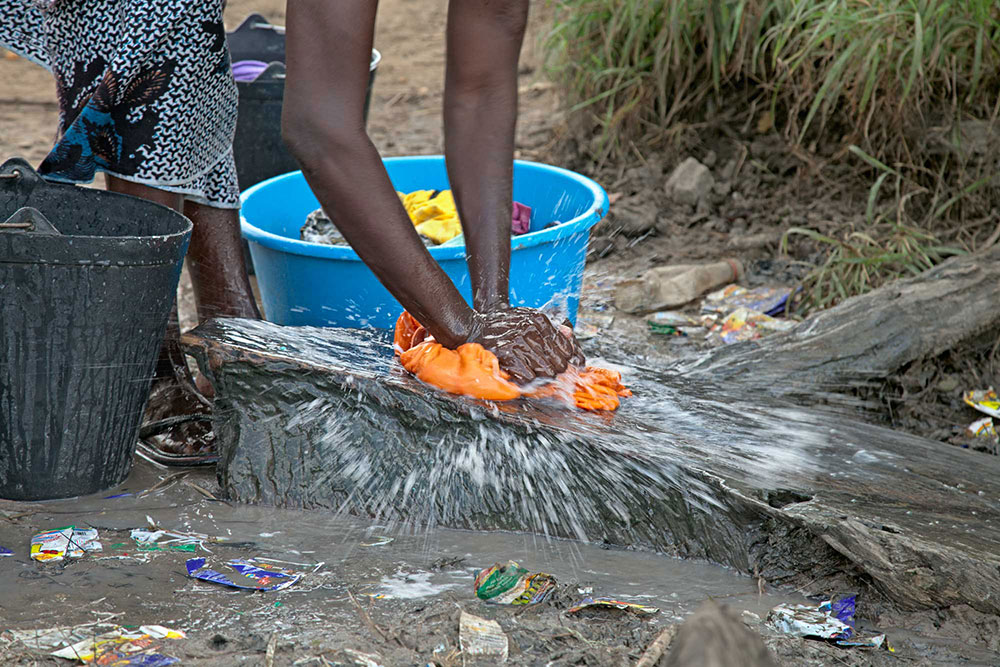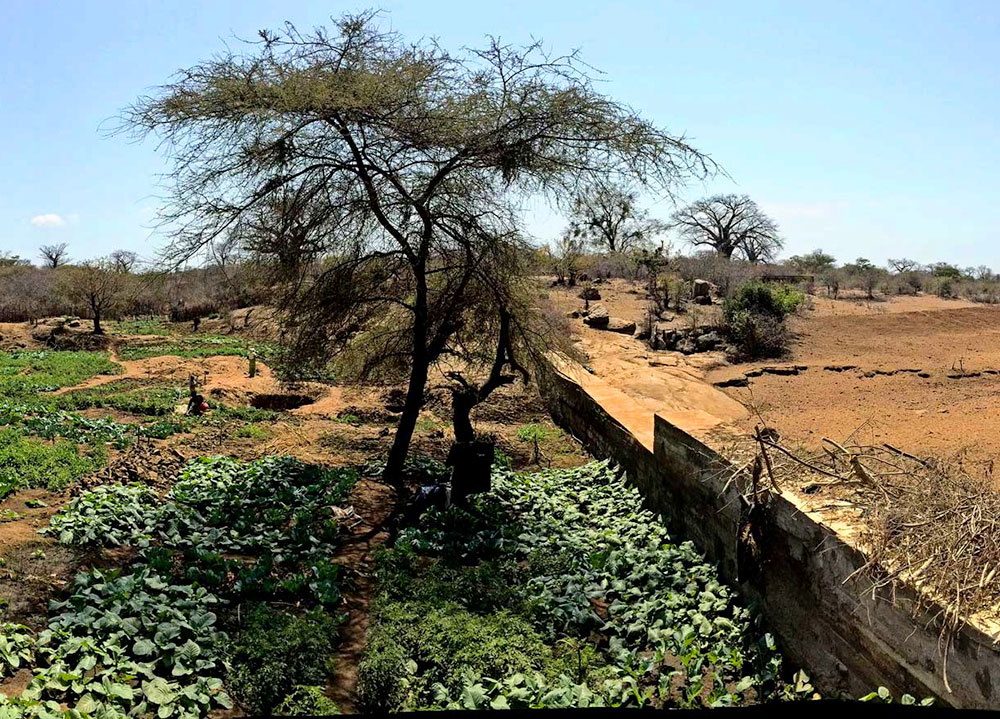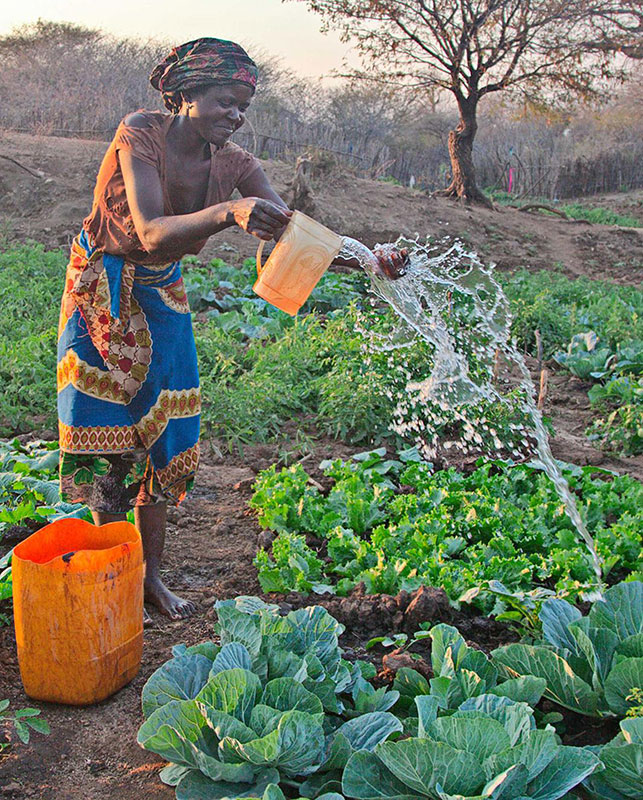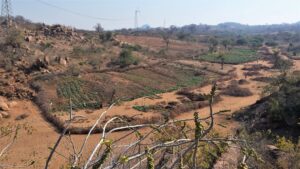Six men grasp the long metal handle of the drill and walk slowly in a circle. They lean into the task, using body weight to drive the shaft of the drill into the dry soil of Mozambique’s Caia District.
They have hand-drilled some five metres down and have farther to go, possibly four metres or more. Even then, there’s no guarantee the water will be potable. An attempt at a nearby location was abandoned after three days of drilling when workers found water too salty to be used.
Community members in Ndoro in Caia District draw water from a well drilled in 2014. Capped wells with pumps provide a protected source of water for drinking, washing dishes and clothes, and bathing.
Across Mozambique, the search for clean and reliable water is urgent and constant.
In some locations, people risk illness by drinking from contaminated sources. In other areas, months of drought leave communities unable to sustain gardens and livestock.
“We’re trying to move away from just responding to these emergencies,” says Jana Meyer, a Mennonite Central Committee (MCC) representative in Mozambique. “We are finding ways to prevent them or make the situation more tolerable.”
Through its partnership with the Christian Council of Mozambique, an organization representing up to 24 Christian churches across Mozambique, MCC is investing in water projects in dozens of communities, from drilling and maintaining wells to harvesting water from sand.
Henriques Cubonera Mbondo admits that when he first heard about the plan for a sand dam in his village of Maule Maule in Tete Province, he was perplexed. “I thought water from sand, how can that be?” he says. “But now I know it’s possible, and we have lots of water. You can see my garden. We have kale, lettuce, tomatoes, cabbage.”
A sand dam is essentially a way to store water. A concrete wall is built across a dry riverbed. During the rainy season, the wall slows the flow of the river and water infuses the coarse sand that builds up behind the wall. The sand accumulates over time, and water can be extracted by digging into the sand during the dry season.
MCC and the Christian council, with support from the Canadian Foodgrains Bank, have supported the building of sand dams in Mozambique’s Changara District since 2008. Community members dig the foundation, collect rocks and do other physical tasks. When water is available, community members are given seeds and trained in conservation agriculture methods. MCC provides construction materials and seeds, and supports the salaries of some council staff. The Foodgrains Bank provides a grant.
“This district has a great challenge with food security,” says Tiago Vilanculo, who oversees the council’s work in Changara. “The rain falls maybe three months a year. Temperatures can reach 45 degrees Celsius and there’s a large livestock population. These communities need water.”
The sand dam in Maule Maule was built in 2013. Tino Gento was born in the village 45 years ago, but this is her first garden. She will use a large tomato she’s just picked to make a sauce for chima—a porridge of ground maize, sorghum or millet—for her husband and eight children.
She laughs as she points to her stomach. “We are eating a lot more vegetables now. You can see that our bellies are full, “she says. “We had kids who were not healthy, but now they are.”
For Mbondo, who has more vegetables than his family of seven can eat, the garden is also a source of income. “Now I don’t have to go into the bush and find firewood to sell,” he says. “I can sell vegetables to buy oil and have my maize ground into flour, maybe buy some goats. I feel secure.”
In Caia District in central Mozambique, the challenge is finding potable water free from contaminants, salt or other hazards.
Nfumo Arvelino Bonjesse Ntanda is 60 years old and a community leader in the village of Ndoro. Until a few years ago, his village got water from the Zangue River.
“At the river we got attacked by crocodiles,” he says. “As many as 16 people lost their lives.”
The wells, some as deep at 10 metres, have concrete coverings at ground to protect against contamination and a hand pump is used to draw water. The Christian council works with communities to train people to maintain the well and make simple repairs. A committee elected by the community oversees maintenance of the pump, cleanliness around the well and collection of a small fee from each household that uses the well.
“We were crying out for this well,” says Bernard Lapissone, president of Ndoro’s well management committee. “Now, there’s not as much sickness and our children can go to school clean.”
These efforts are changing the lives of thousands. Each well provides water for 500 people, sometimes more if wells in nearby communities aren’t functioning. Between 2004 and 2014, 69 wells were constructed through MCC’s partnership with the council. Forty-two sand dams, built with the support of MCC and the Foodgrains Bank since 2008, provide water to other communities, serving more than 12,000 people.
For Meyer, this is not only providing water but also building peace, a key part of MCC’s mission. “I think of the passage in Isaiah 32, where peace is described as a place where you can have your animals and a place to live and a place to cultivate,” she says. “This is how I see these projects.”









Leave a Reply
You must be logged in to post a comment.